Building Law 200292 Essay: Security of Payment Act and Amendments
VerifiedAdded on 2022/11/09
|9
|2434
|155
Essay
AI Summary
This essay provides a comprehensive analysis of the Building and Construction Industry Security of Payment Act 1999 (the Act) in New South Wales. It begins by introducing the Act's purpose: to minimize bankruptcies in the construction sector by protecting contractors and establishing legal mechanisms for recovering late payments. The essay details how the Act works, including its application to various construction contracts, the process for making payment claims, and the rights of contractors to suspend work for non-payment. It explains the reasons for the Act's introduction, highlighting its role in ensuring timely payments and providing a faster, more economical process for resolving payment disputes. The essay then explores the Act's relationship with court actions and the recent amendments, particularly those affecting subcontractors and the removal of reference dates. Finally, it concludes by emphasizing the Act's significance in promoting improved cash flow and addressing payment issues within the construction industry. The essay also includes a bibliography of relevant articles and books.
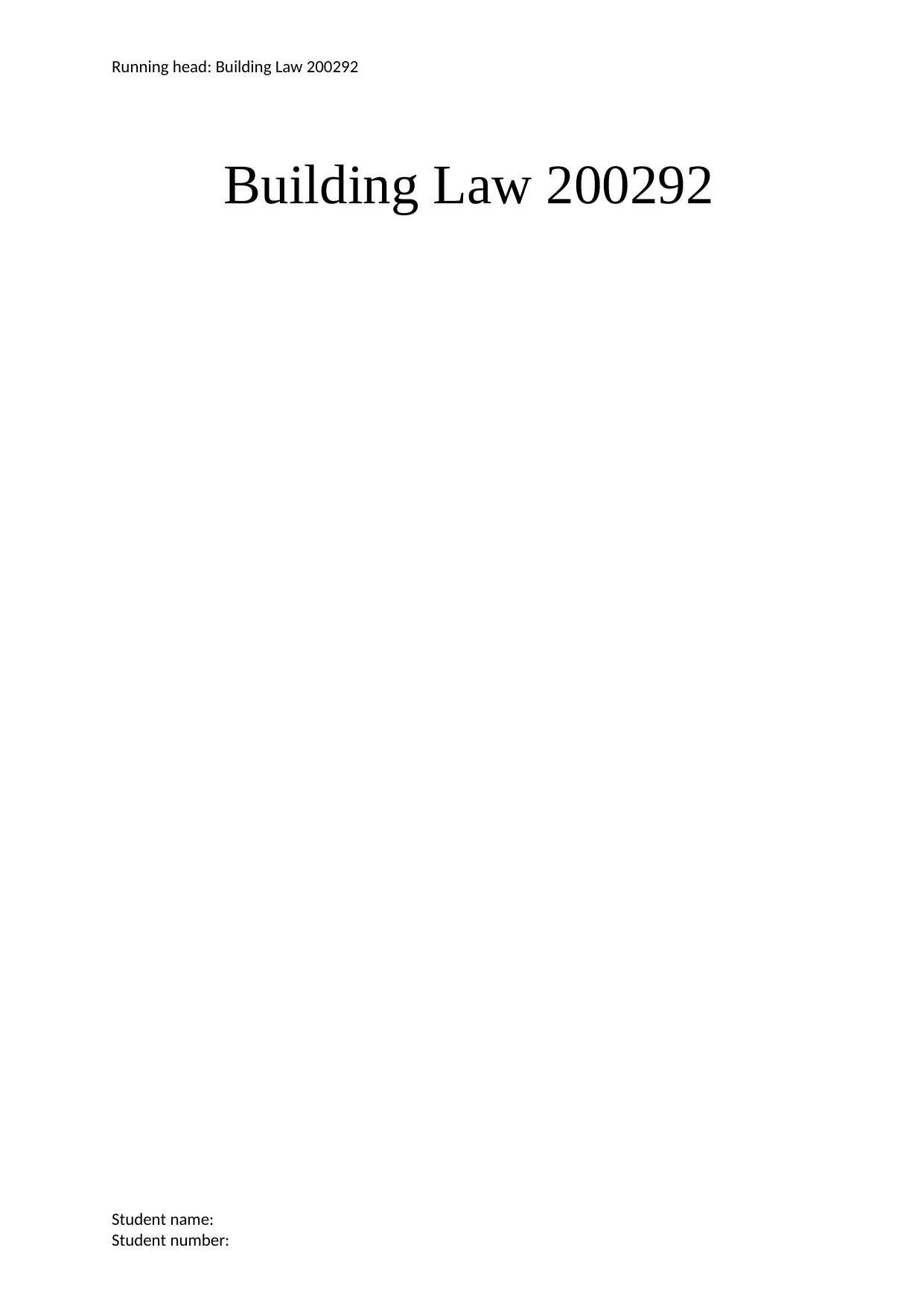
Running head: Building Law 200292
Building Law 200292
Student name:
Student number:
Building Law 200292
Student name:
Student number:
Paraphrase This Document
Need a fresh take? Get an instant paraphrase of this document with our AI Paraphraser
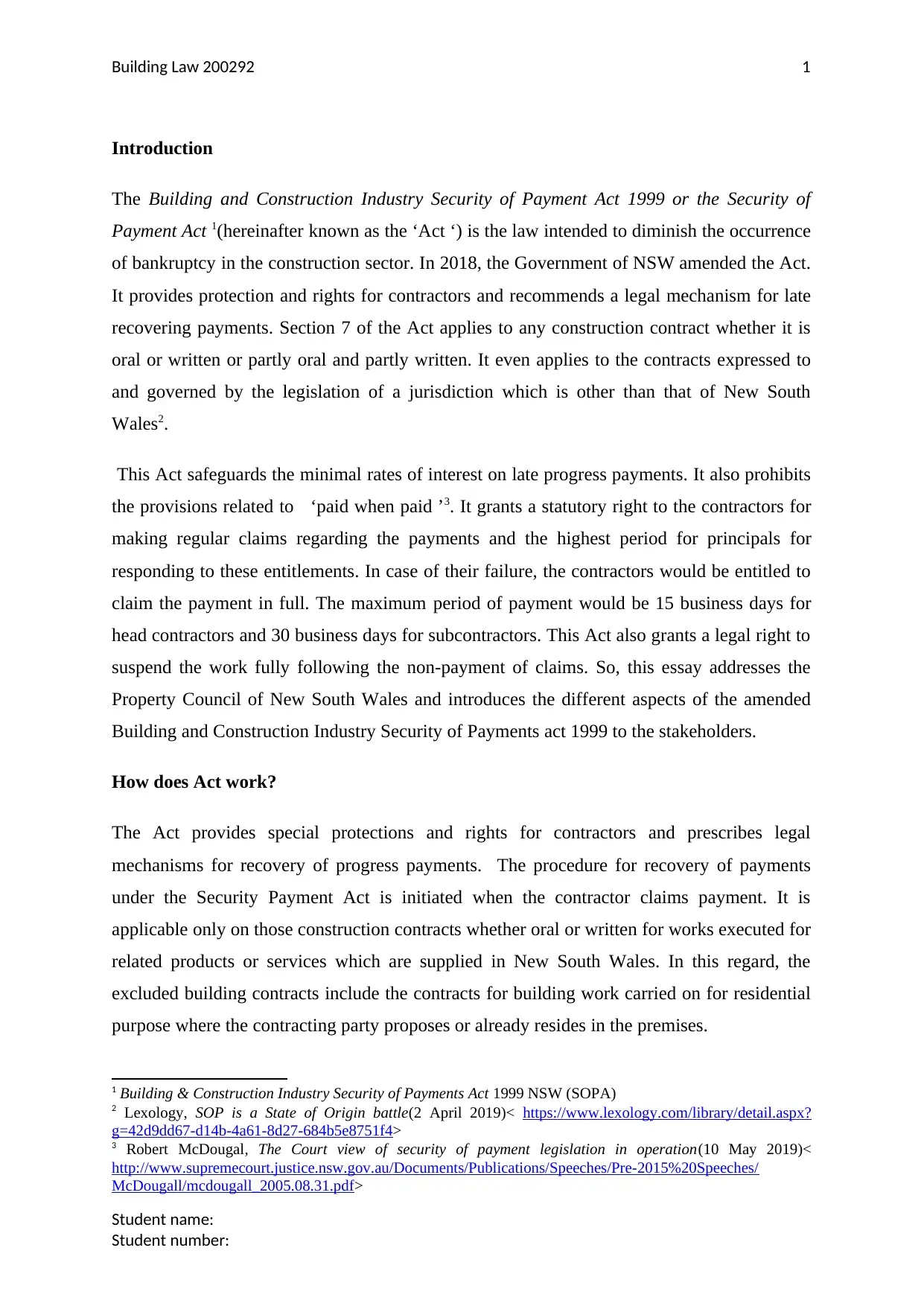
Building Law 200292 1
Introduction
The Building and Construction Industry Security of Payment Act 1999 or the Security of
Payment Act 1(hereinafter known as the ‘Act ‘) is the law intended to diminish the occurrence
of bankruptcy in the construction sector. In 2018, the Government of NSW amended the Act.
It provides protection and rights for contractors and recommends a legal mechanism for late
recovering payments. Section 7 of the Act applies to any construction contract whether it is
oral or written or partly oral and partly written. It even applies to the contracts expressed to
and governed by the legislation of a jurisdiction which is other than that of New South
Wales2.
This Act safeguards the minimal rates of interest on late progress payments. It also prohibits
the provisions related to ‘paid when paid ’3. It grants a statutory right to the contractors for
making regular claims regarding the payments and the highest period for principals for
responding to these entitlements. In case of their failure, the contractors would be entitled to
claim the payment in full. The maximum period of payment would be 15 business days for
head contractors and 30 business days for subcontractors. This Act also grants a legal right to
suspend the work fully following the non-payment of claims. So, this essay addresses the
Property Council of New South Wales and introduces the different aspects of the amended
Building and Construction Industry Security of Payments act 1999 to the stakeholders.
How does Act work?
The Act provides special protections and rights for contractors and prescribes legal
mechanisms for recovery of progress payments. The procedure for recovery of payments
under the Security Payment Act is initiated when the contractor claims payment. It is
applicable only on those construction contracts whether oral or written for works executed for
related products or services which are supplied in New South Wales. In this regard, the
excluded building contracts include the contracts for building work carried on for residential
purpose where the contracting party proposes or already resides in the premises.
1 Building & Construction Industry Security of Payments Act 1999 NSW (SOPA)
2 Lexology, SOP is a State of Origin battle(2 April 2019)< https://www.lexology.com/library/detail.aspx?
g=42d9dd67-d14b-4a61-8d27-684b5e8751f4>
3 Robert McDougal, The Court view of security of payment legislation in operation(10 May 2019)<
http://www.supremecourt.justice.nsw.gov.au/Documents/Publications/Speeches/Pre-2015%20Speeches/
McDougall/mcdougall_2005.08.31.pdf>
Student name:
Student number:
Introduction
The Building and Construction Industry Security of Payment Act 1999 or the Security of
Payment Act 1(hereinafter known as the ‘Act ‘) is the law intended to diminish the occurrence
of bankruptcy in the construction sector. In 2018, the Government of NSW amended the Act.
It provides protection and rights for contractors and recommends a legal mechanism for late
recovering payments. Section 7 of the Act applies to any construction contract whether it is
oral or written or partly oral and partly written. It even applies to the contracts expressed to
and governed by the legislation of a jurisdiction which is other than that of New South
Wales2.
This Act safeguards the minimal rates of interest on late progress payments. It also prohibits
the provisions related to ‘paid when paid ’3. It grants a statutory right to the contractors for
making regular claims regarding the payments and the highest period for principals for
responding to these entitlements. In case of their failure, the contractors would be entitled to
claim the payment in full. The maximum period of payment would be 15 business days for
head contractors and 30 business days for subcontractors. This Act also grants a legal right to
suspend the work fully following the non-payment of claims. So, this essay addresses the
Property Council of New South Wales and introduces the different aspects of the amended
Building and Construction Industry Security of Payments act 1999 to the stakeholders.
How does Act work?
The Act provides special protections and rights for contractors and prescribes legal
mechanisms for recovery of progress payments. The procedure for recovery of payments
under the Security Payment Act is initiated when the contractor claims payment. It is
applicable only on those construction contracts whether oral or written for works executed for
related products or services which are supplied in New South Wales. In this regard, the
excluded building contracts include the contracts for building work carried on for residential
purpose where the contracting party proposes or already resides in the premises.
1 Building & Construction Industry Security of Payments Act 1999 NSW (SOPA)
2 Lexology, SOP is a State of Origin battle(2 April 2019)< https://www.lexology.com/library/detail.aspx?
g=42d9dd67-d14b-4a61-8d27-684b5e8751f4>
3 Robert McDougal, The Court view of security of payment legislation in operation(10 May 2019)<
http://www.supremecourt.justice.nsw.gov.au/Documents/Publications/Speeches/Pre-2015%20Speeches/
McDougall/mcdougall_2005.08.31.pdf>
Student name:
Student number:
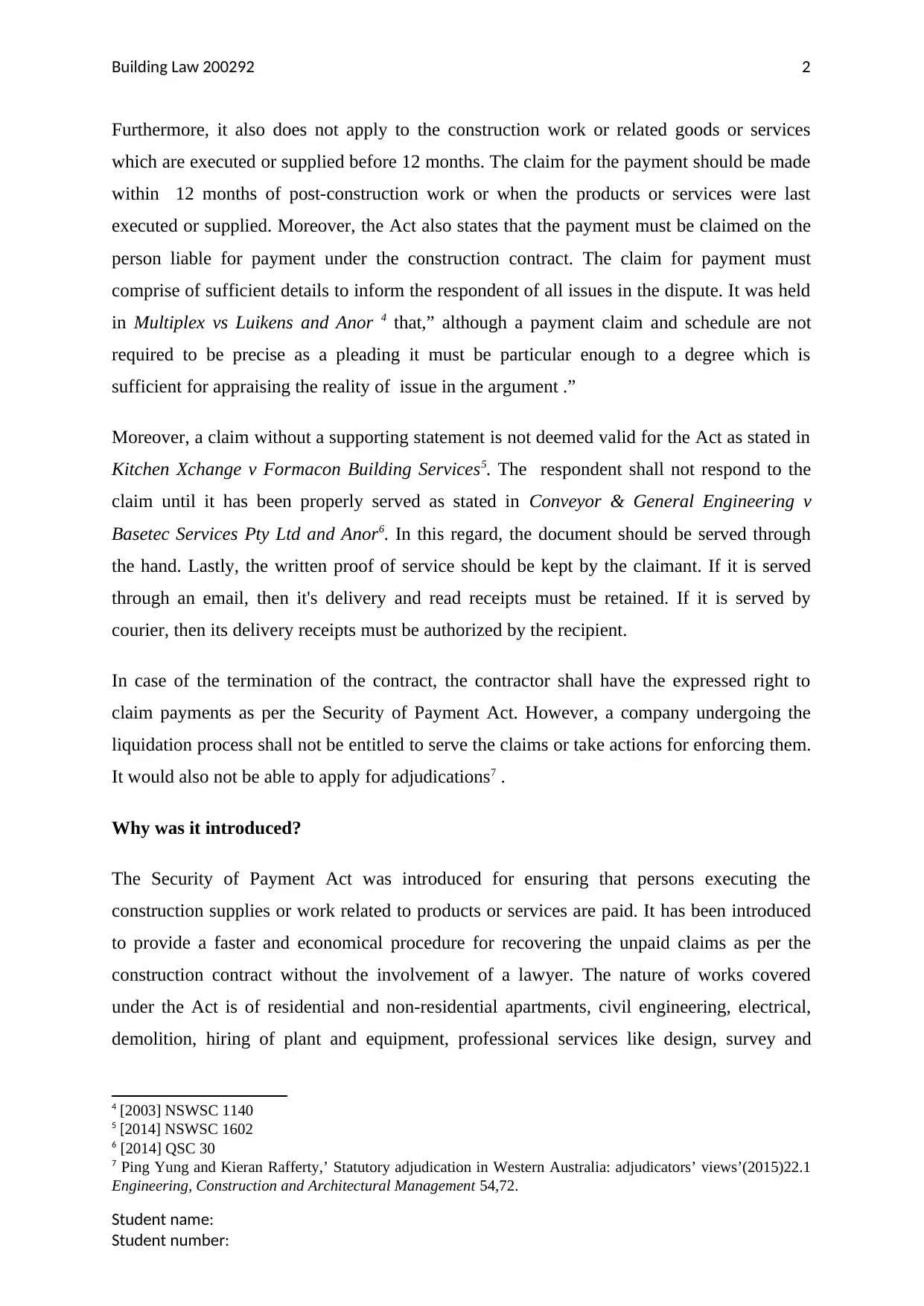
Building Law 200292 2
Furthermore, it also does not apply to the construction work or related goods or services
which are executed or supplied before 12 months. The claim for the payment should be made
within 12 months of post-construction work or when the products or services were last
executed or supplied. Moreover, the Act also states that the payment must be claimed on the
person liable for payment under the construction contract. The claim for payment must
comprise of sufficient details to inform the respondent of all issues in the dispute. It was held
in Multiplex vs Luikens and Anor 4 that,” although a payment claim and schedule are not
required to be precise as a pleading it must be particular enough to a degree which is
sufficient for appraising the reality of issue in the argument .”
Moreover, a claim without a supporting statement is not deemed valid for the Act as stated in
Kitchen Xchange v Formacon Building Services5. The respondent shall not respond to the
claim until it has been properly served as stated in Conveyor & General Engineering v
Basetec Services Pty Ltd and Anor6. In this regard, the document should be served through
the hand. Lastly, the written proof of service should be kept by the claimant. If it is served
through an email, then it's delivery and read receipts must be retained. If it is served by
courier, then its delivery receipts must be authorized by the recipient.
In case of the termination of the contract, the contractor shall have the expressed right to
claim payments as per the Security of Payment Act. However, a company undergoing the
liquidation process shall not be entitled to serve the claims or take actions for enforcing them.
It would also not be able to apply for adjudications7 .
Why was it introduced?
The Security of Payment Act was introduced for ensuring that persons executing the
construction supplies or work related to products or services are paid. It has been introduced
to provide a faster and economical procedure for recovering the unpaid claims as per the
construction contract without the involvement of a lawyer. The nature of works covered
under the Act is of residential and non-residential apartments, civil engineering, electrical,
demolition, hiring of plant and equipment, professional services like design, survey and
4 [2003] NSWSC 1140
5 [2014] NSWSC 1602
6 [2014] QSC 30
7 Ping Yung and Kieran Rafferty,’ Statutory adjudication in Western Australia: adjudicators’ views’(2015)22.1
Engineering, Construction and Architectural Management 54,72.
Student name:
Student number:
Furthermore, it also does not apply to the construction work or related goods or services
which are executed or supplied before 12 months. The claim for the payment should be made
within 12 months of post-construction work or when the products or services were last
executed or supplied. Moreover, the Act also states that the payment must be claimed on the
person liable for payment under the construction contract. The claim for payment must
comprise of sufficient details to inform the respondent of all issues in the dispute. It was held
in Multiplex vs Luikens and Anor 4 that,” although a payment claim and schedule are not
required to be precise as a pleading it must be particular enough to a degree which is
sufficient for appraising the reality of issue in the argument .”
Moreover, a claim without a supporting statement is not deemed valid for the Act as stated in
Kitchen Xchange v Formacon Building Services5. The respondent shall not respond to the
claim until it has been properly served as stated in Conveyor & General Engineering v
Basetec Services Pty Ltd and Anor6. In this regard, the document should be served through
the hand. Lastly, the written proof of service should be kept by the claimant. If it is served
through an email, then it's delivery and read receipts must be retained. If it is served by
courier, then its delivery receipts must be authorized by the recipient.
In case of the termination of the contract, the contractor shall have the expressed right to
claim payments as per the Security of Payment Act. However, a company undergoing the
liquidation process shall not be entitled to serve the claims or take actions for enforcing them.
It would also not be able to apply for adjudications7 .
Why was it introduced?
The Security of Payment Act was introduced for ensuring that persons executing the
construction supplies or work related to products or services are paid. It has been introduced
to provide a faster and economical procedure for recovering the unpaid claims as per the
construction contract without the involvement of a lawyer. The nature of works covered
under the Act is of residential and non-residential apartments, civil engineering, electrical,
demolition, hiring of plant and equipment, professional services like design, survey and
4 [2003] NSWSC 1140
5 [2014] NSWSC 1602
6 [2014] QSC 30
7 Ping Yung and Kieran Rafferty,’ Statutory adjudication in Western Australia: adjudicators’ views’(2015)22.1
Engineering, Construction and Architectural Management 54,72.
Student name:
Student number:
⊘ This is a preview!⊘
Do you want full access?
Subscribe today to unlock all pages.

Trusted by 1+ million students worldwide
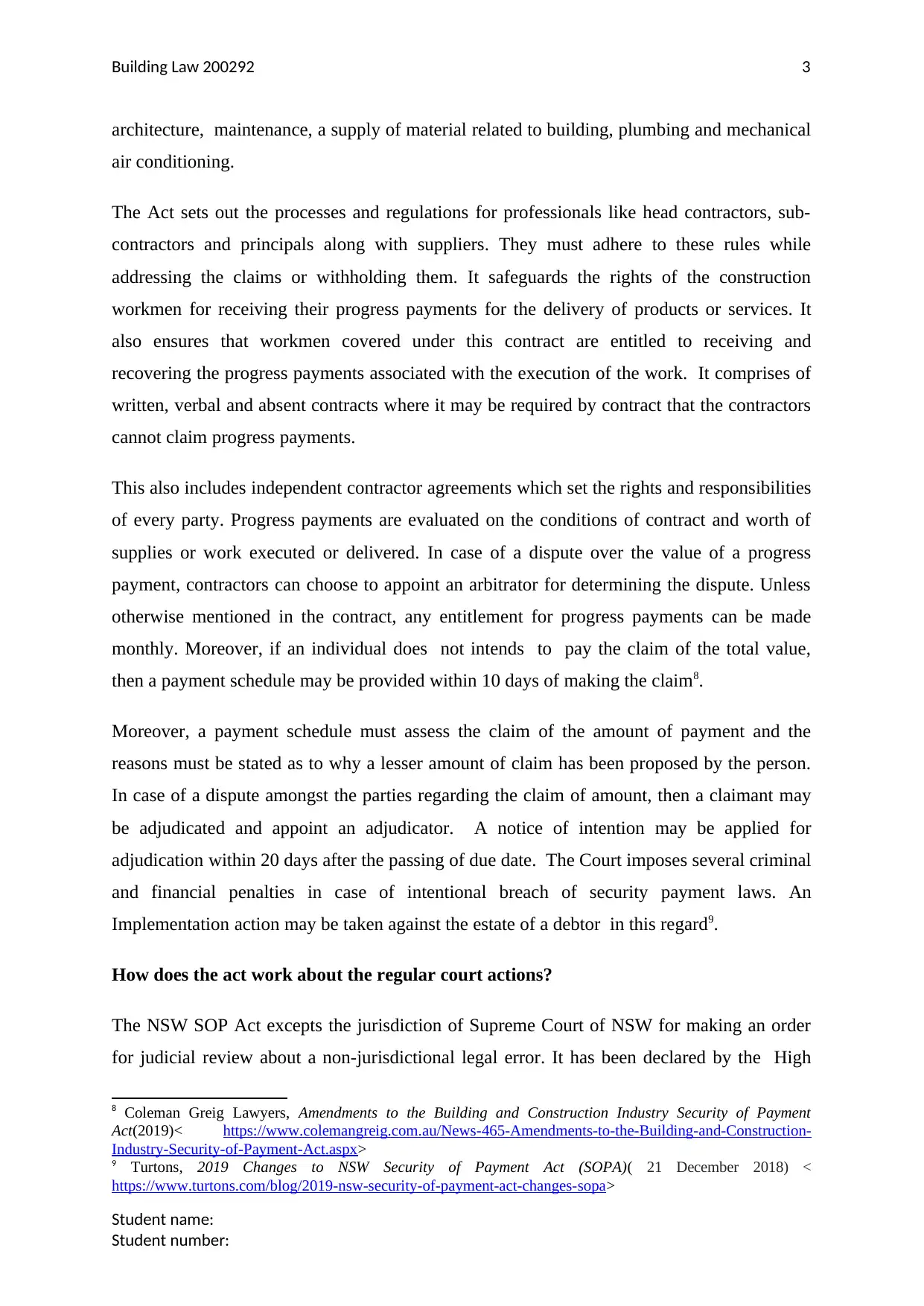
Building Law 200292 3
architecture, maintenance, a supply of material related to building, plumbing and mechanical
air conditioning.
The Act sets out the processes and regulations for professionals like head contractors, sub-
contractors and principals along with suppliers. They must adhere to these rules while
addressing the claims or withholding them. It safeguards the rights of the construction
workmen for receiving their progress payments for the delivery of products or services. It
also ensures that workmen covered under this contract are entitled to receiving and
recovering the progress payments associated with the execution of the work. It comprises of
written, verbal and absent contracts where it may be required by contract that the contractors
cannot claim progress payments.
This also includes independent contractor agreements which set the rights and responsibilities
of every party. Progress payments are evaluated on the conditions of contract and worth of
supplies or work executed or delivered. In case of a dispute over the value of a progress
payment, contractors can choose to appoint an arbitrator for determining the dispute. Unless
otherwise mentioned in the contract, any entitlement for progress payments can be made
monthly. Moreover, if an individual does not intends to pay the claim of the total value,
then a payment schedule may be provided within 10 days of making the claim8.
Moreover, a payment schedule must assess the claim of the amount of payment and the
reasons must be stated as to why a lesser amount of claim has been proposed by the person.
In case of a dispute amongst the parties regarding the claim of amount, then a claimant may
be adjudicated and appoint an adjudicator. A notice of intention may be applied for
adjudication within 20 days after the passing of due date. The Court imposes several criminal
and financial penalties in case of intentional breach of security payment laws. An
Implementation action may be taken against the estate of a debtor in this regard9.
How does the act work about the regular court actions?
The NSW SOP Act excepts the jurisdiction of Supreme Court of NSW for making an order
for judicial review about a non-jurisdictional legal error. It has been declared by the High
8 Coleman Greig Lawyers, Amendments to the Building and Construction Industry Security of Payment
Act(2019)< https://www.colemangreig.com.au/News-465-Amendments-to-the-Building-and-Construction-
Industry-Security-of-Payment-Act.aspx>
9 Turtons, 2019 Changes to NSW Security of Payment Act (SOPA)( 21 December 2018) <
https://www.turtons.com/blog/2019-nsw-security-of-payment-act-changes-sopa>
Student name:
Student number:
architecture, maintenance, a supply of material related to building, plumbing and mechanical
air conditioning.
The Act sets out the processes and regulations for professionals like head contractors, sub-
contractors and principals along with suppliers. They must adhere to these rules while
addressing the claims or withholding them. It safeguards the rights of the construction
workmen for receiving their progress payments for the delivery of products or services. It
also ensures that workmen covered under this contract are entitled to receiving and
recovering the progress payments associated with the execution of the work. It comprises of
written, verbal and absent contracts where it may be required by contract that the contractors
cannot claim progress payments.
This also includes independent contractor agreements which set the rights and responsibilities
of every party. Progress payments are evaluated on the conditions of contract and worth of
supplies or work executed or delivered. In case of a dispute over the value of a progress
payment, contractors can choose to appoint an arbitrator for determining the dispute. Unless
otherwise mentioned in the contract, any entitlement for progress payments can be made
monthly. Moreover, if an individual does not intends to pay the claim of the total value,
then a payment schedule may be provided within 10 days of making the claim8.
Moreover, a payment schedule must assess the claim of the amount of payment and the
reasons must be stated as to why a lesser amount of claim has been proposed by the person.
In case of a dispute amongst the parties regarding the claim of amount, then a claimant may
be adjudicated and appoint an adjudicator. A notice of intention may be applied for
adjudication within 20 days after the passing of due date. The Court imposes several criminal
and financial penalties in case of intentional breach of security payment laws. An
Implementation action may be taken against the estate of a debtor in this regard9.
How does the act work about the regular court actions?
The NSW SOP Act excepts the jurisdiction of Supreme Court of NSW for making an order
for judicial review about a non-jurisdictional legal error. It has been declared by the High
8 Coleman Greig Lawyers, Amendments to the Building and Construction Industry Security of Payment
Act(2019)< https://www.colemangreig.com.au/News-465-Amendments-to-the-Building-and-Construction-
Industry-Security-of-Payment-Act.aspx>
9 Turtons, 2019 Changes to NSW Security of Payment Act (SOPA)( 21 December 2018) <
https://www.turtons.com/blog/2019-nsw-security-of-payment-act-changes-sopa>
Student name:
Student number:
Paraphrase This Document
Need a fresh take? Get an instant paraphrase of this document with our AI Paraphraser
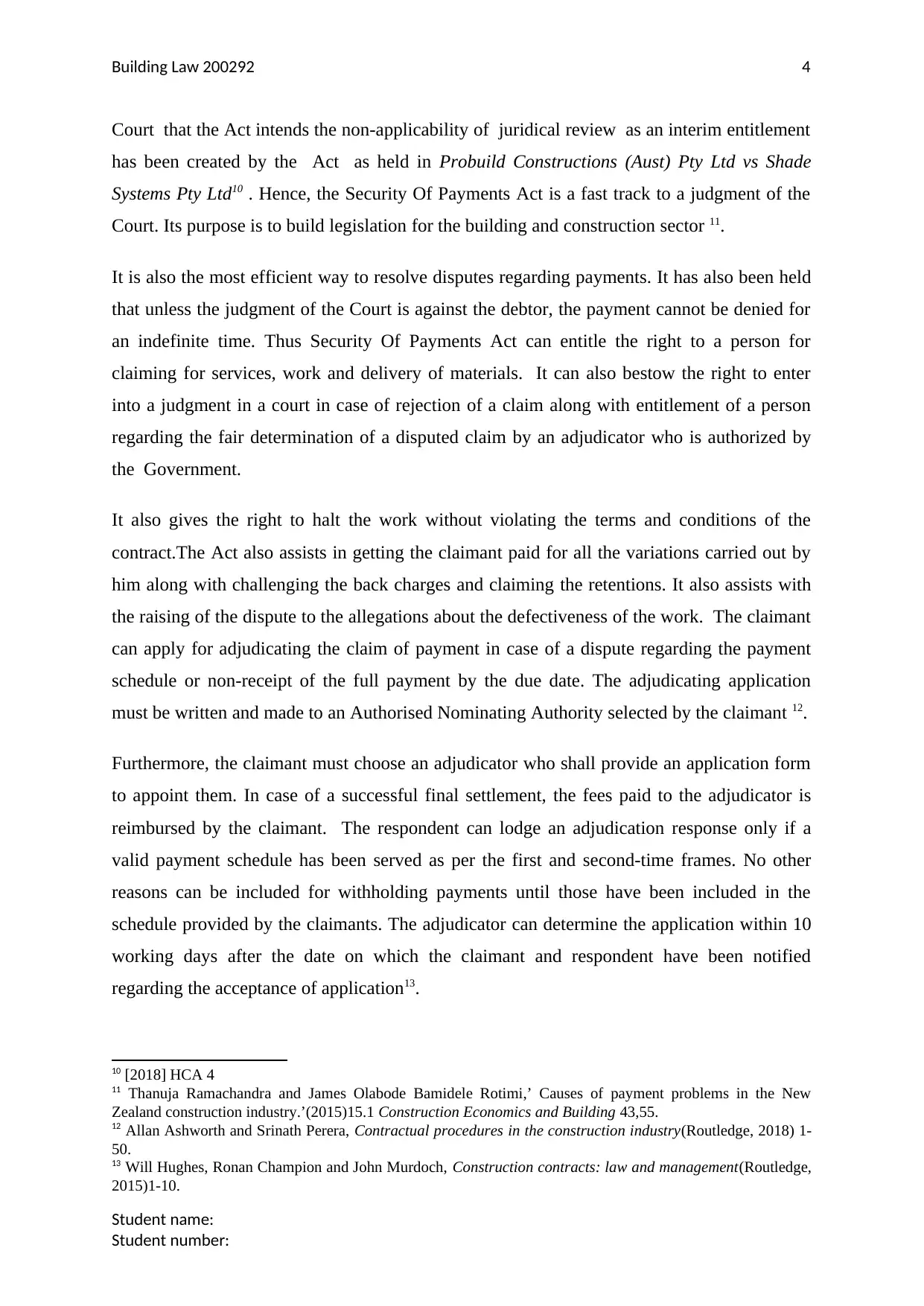
Building Law 200292 4
Court that the Act intends the non-applicability of juridical review as an interim entitlement
has been created by the Act as held in Probuild Constructions (Aust) Pty Ltd vs Shade
Systems Pty Ltd10 . Hence, the Security Of Payments Act is a fast track to a judgment of the
Court. Its purpose is to build legislation for the building and construction sector 11.
It is also the most efficient way to resolve disputes regarding payments. It has also been held
that unless the judgment of the Court is against the debtor, the payment cannot be denied for
an indefinite time. Thus Security Of Payments Act can entitle the right to a person for
claiming for services, work and delivery of materials. It can also bestow the right to enter
into a judgment in a court in case of rejection of a claim along with entitlement of a person
regarding the fair determination of a disputed claim by an adjudicator who is authorized by
the Government.
It also gives the right to halt the work without violating the terms and conditions of the
contract.The Act also assists in getting the claimant paid for all the variations carried out by
him along with challenging the back charges and claiming the retentions. It also assists with
the raising of the dispute to the allegations about the defectiveness of the work. The claimant
can apply for adjudicating the claim of payment in case of a dispute regarding the payment
schedule or non-receipt of the full payment by the due date. The adjudicating application
must be written and made to an Authorised Nominating Authority selected by the claimant 12.
Furthermore, the claimant must choose an adjudicator who shall provide an application form
to appoint them. In case of a successful final settlement, the fees paid to the adjudicator is
reimbursed by the claimant. The respondent can lodge an adjudication response only if a
valid payment schedule has been served as per the first and second-time frames. No other
reasons can be included for withholding payments until those have been included in the
schedule provided by the claimants. The adjudicator can determine the application within 10
working days after the date on which the claimant and respondent have been notified
regarding the acceptance of application13.
10 [2018] HCA 4
11 Thanuja Ramachandra and James Olabode Bamidele Rotimi,’ Causes of payment problems in the New
Zealand construction industry.’(2015)15.1 Construction Economics and Building 43,55.
12 Allan Ashworth and Srinath Perera, Contractual procedures in the construction industry(Routledge, 2018) 1-
50.
13 Will Hughes, Ronan Champion and John Murdoch, Construction contracts: law and management(Routledge,
2015)1-10.
Student name:
Student number:
Court that the Act intends the non-applicability of juridical review as an interim entitlement
has been created by the Act as held in Probuild Constructions (Aust) Pty Ltd vs Shade
Systems Pty Ltd10 . Hence, the Security Of Payments Act is a fast track to a judgment of the
Court. Its purpose is to build legislation for the building and construction sector 11.
It is also the most efficient way to resolve disputes regarding payments. It has also been held
that unless the judgment of the Court is against the debtor, the payment cannot be denied for
an indefinite time. Thus Security Of Payments Act can entitle the right to a person for
claiming for services, work and delivery of materials. It can also bestow the right to enter
into a judgment in a court in case of rejection of a claim along with entitlement of a person
regarding the fair determination of a disputed claim by an adjudicator who is authorized by
the Government.
It also gives the right to halt the work without violating the terms and conditions of the
contract.The Act also assists in getting the claimant paid for all the variations carried out by
him along with challenging the back charges and claiming the retentions. It also assists with
the raising of the dispute to the allegations about the defectiveness of the work. The claimant
can apply for adjudicating the claim of payment in case of a dispute regarding the payment
schedule or non-receipt of the full payment by the due date. The adjudicating application
must be written and made to an Authorised Nominating Authority selected by the claimant 12.
Furthermore, the claimant must choose an adjudicator who shall provide an application form
to appoint them. In case of a successful final settlement, the fees paid to the adjudicator is
reimbursed by the claimant. The respondent can lodge an adjudication response only if a
valid payment schedule has been served as per the first and second-time frames. No other
reasons can be included for withholding payments until those have been included in the
schedule provided by the claimants. The adjudicator can determine the application within 10
working days after the date on which the claimant and respondent have been notified
regarding the acceptance of application13.
10 [2018] HCA 4
11 Thanuja Ramachandra and James Olabode Bamidele Rotimi,’ Causes of payment problems in the New
Zealand construction industry.’(2015)15.1 Construction Economics and Building 43,55.
12 Allan Ashworth and Srinath Perera, Contractual procedures in the construction industry(Routledge, 2018) 1-
50.
13 Will Hughes, Ronan Champion and John Murdoch, Construction contracts: law and management(Routledge,
2015)1-10.
Student name:
Student number:
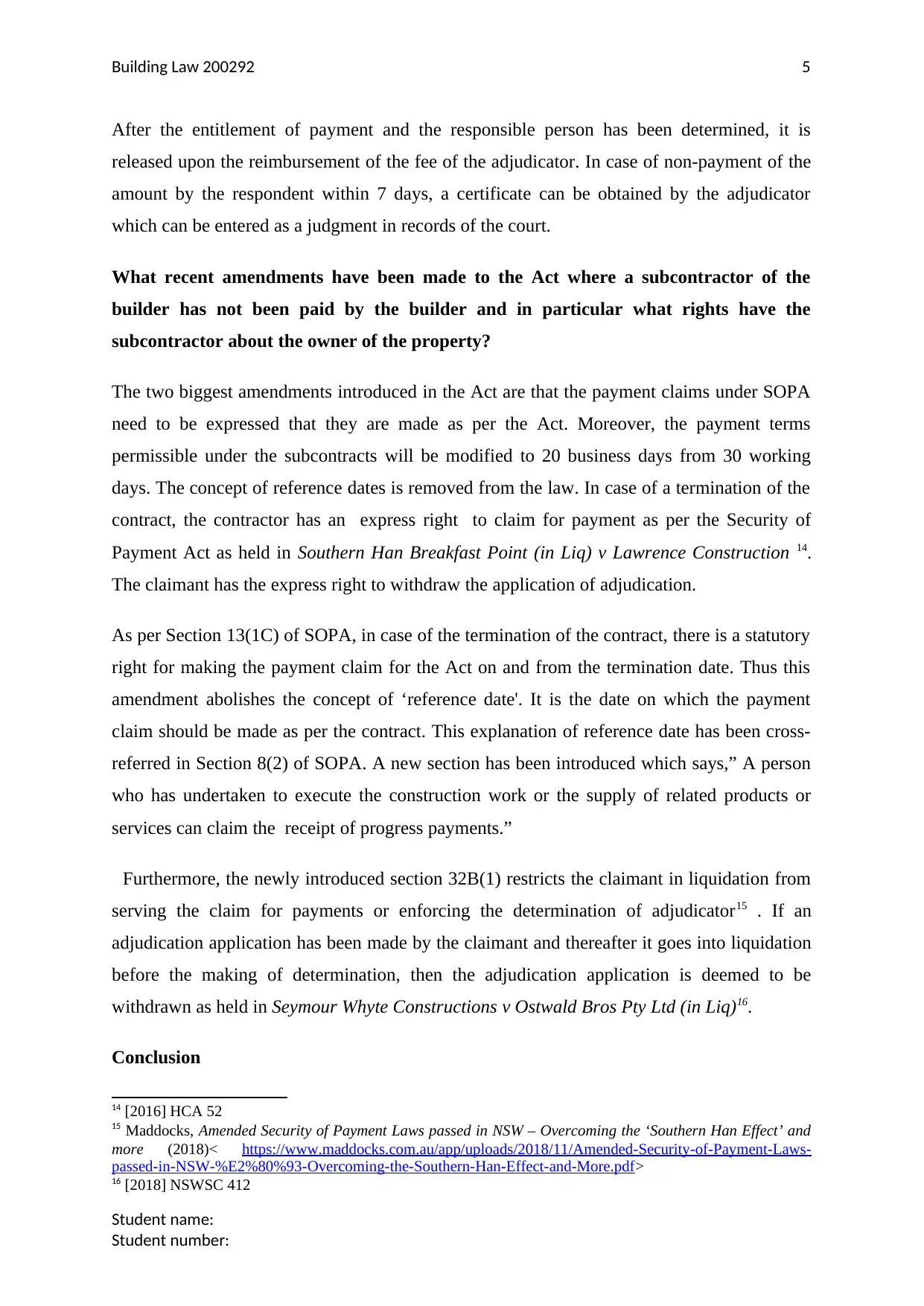
Building Law 200292 5
After the entitlement of payment and the responsible person has been determined, it is
released upon the reimbursement of the fee of the adjudicator. In case of non-payment of the
amount by the respondent within 7 days, a certificate can be obtained by the adjudicator
which can be entered as a judgment in records of the court.
What recent amendments have been made to the Act where a subcontractor of the
builder has not been paid by the builder and in particular what rights have the
subcontractor about the owner of the property?
The two biggest amendments introduced in the Act are that the payment claims under SOPA
need to be expressed that they are made as per the Act. Moreover, the payment terms
permissible under the subcontracts will be modified to 20 business days from 30 working
days. The concept of reference dates is removed from the law. In case of a termination of the
contract, the contractor has an express right to claim for payment as per the Security of
Payment Act as held in Southern Han Breakfast Point (in Liq) v Lawrence Construction 14.
The claimant has the express right to withdraw the application of adjudication.
As per Section 13(1C) of SOPA, in case of the termination of the contract, there is a statutory
right for making the payment claim for the Act on and from the termination date. Thus this
amendment abolishes the concept of ‘reference date'. It is the date on which the payment
claim should be made as per the contract. This explanation of reference date has been cross-
referred in Section 8(2) of SOPA. A new section has been introduced which says,” A person
who has undertaken to execute the construction work or the supply of related products or
services can claim the receipt of progress payments.”
Furthermore, the newly introduced section 32B(1) restricts the claimant in liquidation from
serving the claim for payments or enforcing the determination of adjudicator15 . If an
adjudication application has been made by the claimant and thereafter it goes into liquidation
before the making of determination, then the adjudication application is deemed to be
withdrawn as held in Seymour Whyte Constructions v Ostwald Bros Pty Ltd (in Liq)16.
Conclusion
14 [2016] HCA 52
15 Maddocks, Amended Security of Payment Laws passed in NSW – Overcoming the ‘Southern Han Effect’ and
more (2018)< https://www.maddocks.com.au/app/uploads/2018/11/Amended-Security-of-Payment-Laws-
passed-in-NSW-%E2%80%93-Overcoming-the-Southern-Han-Effect-and-More.pdf>
16 [2018] NSWSC 412
Student name:
Student number:
After the entitlement of payment and the responsible person has been determined, it is
released upon the reimbursement of the fee of the adjudicator. In case of non-payment of the
amount by the respondent within 7 days, a certificate can be obtained by the adjudicator
which can be entered as a judgment in records of the court.
What recent amendments have been made to the Act where a subcontractor of the
builder has not been paid by the builder and in particular what rights have the
subcontractor about the owner of the property?
The two biggest amendments introduced in the Act are that the payment claims under SOPA
need to be expressed that they are made as per the Act. Moreover, the payment terms
permissible under the subcontracts will be modified to 20 business days from 30 working
days. The concept of reference dates is removed from the law. In case of a termination of the
contract, the contractor has an express right to claim for payment as per the Security of
Payment Act as held in Southern Han Breakfast Point (in Liq) v Lawrence Construction 14.
The claimant has the express right to withdraw the application of adjudication.
As per Section 13(1C) of SOPA, in case of the termination of the contract, there is a statutory
right for making the payment claim for the Act on and from the termination date. Thus this
amendment abolishes the concept of ‘reference date'. It is the date on which the payment
claim should be made as per the contract. This explanation of reference date has been cross-
referred in Section 8(2) of SOPA. A new section has been introduced which says,” A person
who has undertaken to execute the construction work or the supply of related products or
services can claim the receipt of progress payments.”
Furthermore, the newly introduced section 32B(1) restricts the claimant in liquidation from
serving the claim for payments or enforcing the determination of adjudicator15 . If an
adjudication application has been made by the claimant and thereafter it goes into liquidation
before the making of determination, then the adjudication application is deemed to be
withdrawn as held in Seymour Whyte Constructions v Ostwald Bros Pty Ltd (in Liq)16.
Conclusion
14 [2016] HCA 52
15 Maddocks, Amended Security of Payment Laws passed in NSW – Overcoming the ‘Southern Han Effect’ and
more (2018)< https://www.maddocks.com.au/app/uploads/2018/11/Amended-Security-of-Payment-Laws-
passed-in-NSW-%E2%80%93-Overcoming-the-Southern-Han-Effect-and-More.pdf>
16 [2018] NSWSC 412
Student name:
Student number:
⊘ This is a preview!⊘
Do you want full access?
Subscribe today to unlock all pages.

Trusted by 1+ million students worldwide
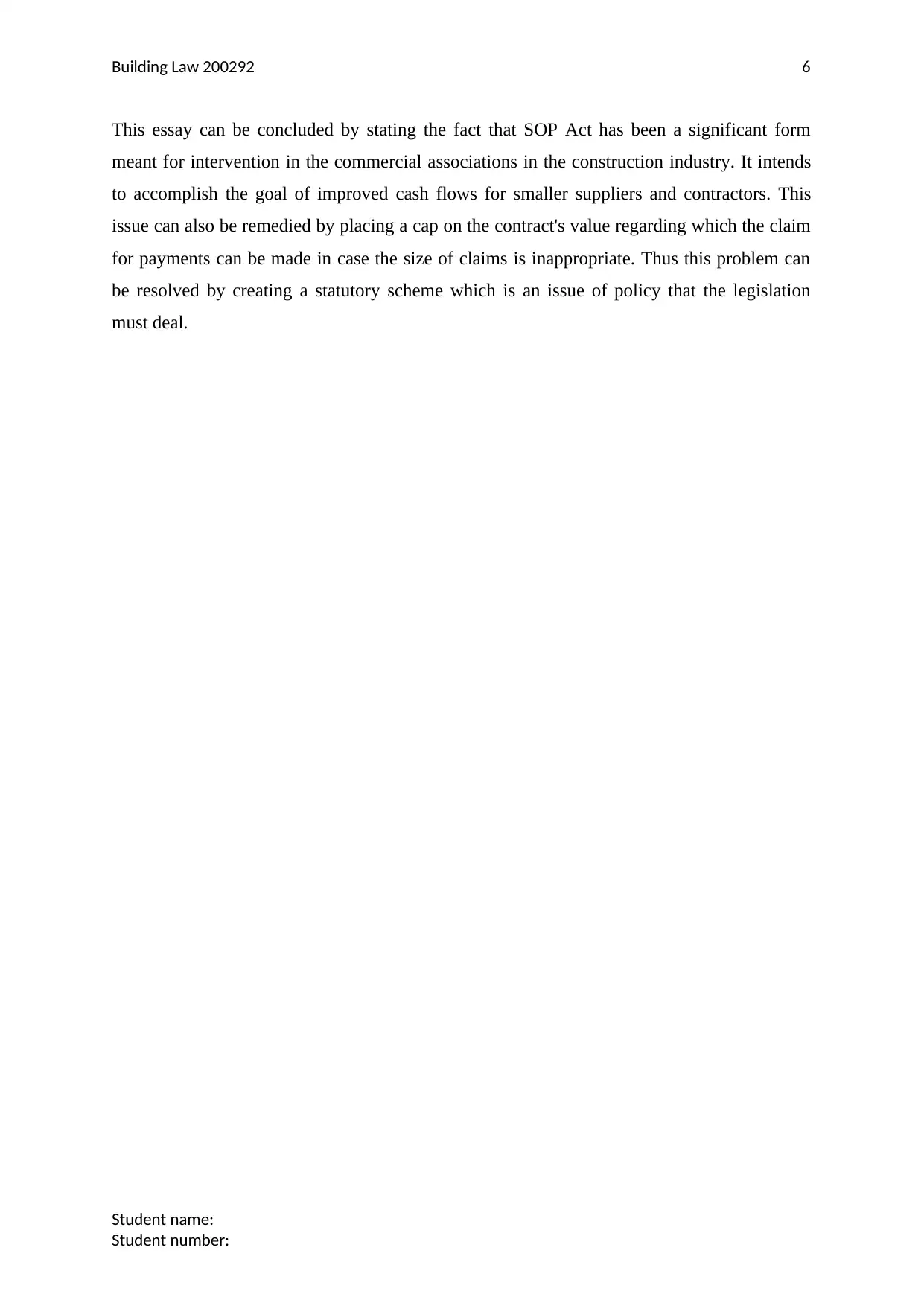
Building Law 200292 6
This essay can be concluded by stating the fact that SOP Act has been a significant form
meant for intervention in the commercial associations in the construction industry. It intends
to accomplish the goal of improved cash flows for smaller suppliers and contractors. This
issue can also be remedied by placing a cap on the contract's value regarding which the claim
for payments can be made in case the size of claims is inappropriate. Thus this problem can
be resolved by creating a statutory scheme which is an issue of policy that the legislation
must deal.
Student name:
Student number:
This essay can be concluded by stating the fact that SOP Act has been a significant form
meant for intervention in the commercial associations in the construction industry. It intends
to accomplish the goal of improved cash flows for smaller suppliers and contractors. This
issue can also be remedied by placing a cap on the contract's value regarding which the claim
for payments can be made in case the size of claims is inappropriate. Thus this problem can
be resolved by creating a statutory scheme which is an issue of policy that the legislation
must deal.
Student name:
Student number:
Paraphrase This Document
Need a fresh take? Get an instant paraphrase of this document with our AI Paraphraser
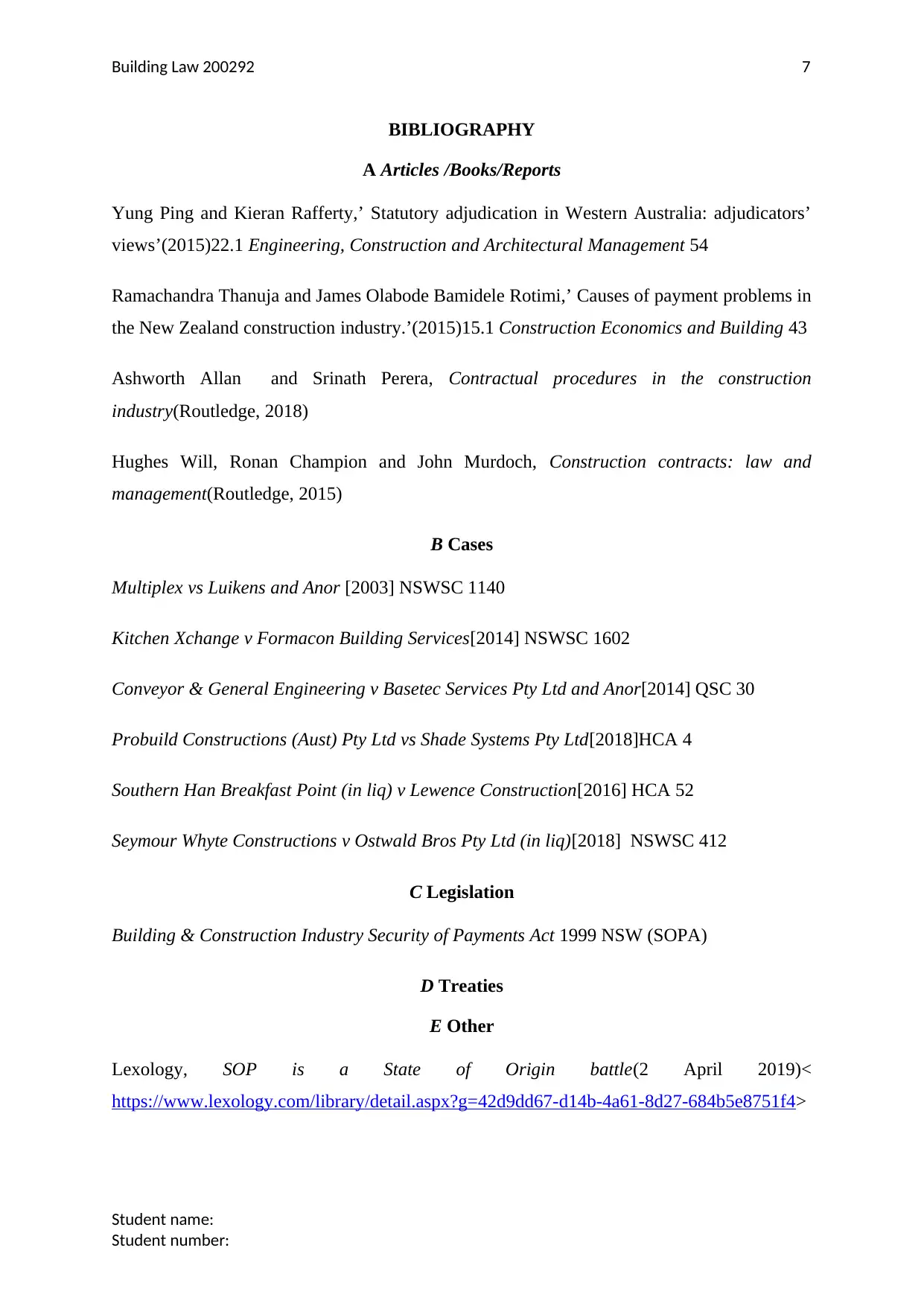
Building Law 200292 7
BIBLIOGRAPHY
A Articles /Books/Reports
Yung Ping and Kieran Rafferty,’ Statutory adjudication in Western Australia: adjudicators’
views’(2015)22.1 Engineering, Construction and Architectural Management 54
Ramachandra Thanuja and James Olabode Bamidele Rotimi,’ Causes of payment problems in
the New Zealand construction industry.’(2015)15.1 Construction Economics and Building 43
Ashworth Allan and Srinath Perera, Contractual procedures in the construction
industry(Routledge, 2018)
Hughes Will, Ronan Champion and John Murdoch, Construction contracts: law and
management(Routledge, 2015)
B Cases
Multiplex vs Luikens and Anor [2003] NSWSC 1140
Kitchen Xchange v Formacon Building Services[2014] NSWSC 1602
Conveyor & General Engineering v Basetec Services Pty Ltd and Anor[2014] QSC 30
Probuild Constructions (Aust) Pty Ltd vs Shade Systems Pty Ltd[2018]HCA 4
Southern Han Breakfast Point (in liq) v Lewence Construction[2016] HCA 52
Seymour Whyte Constructions v Ostwald Bros Pty Ltd (in liq)[2018] NSWSC 412
C Legislation
Building & Construction Industry Security of Payments Act 1999 NSW (SOPA)
D Treaties
E Other
Lexology, SOP is a State of Origin battle(2 April 2019)<
https://www.lexology.com/library/detail.aspx?g=42d9dd67-d14b-4a61-8d27-684b5e8751f4>
Student name:
Student number:
BIBLIOGRAPHY
A Articles /Books/Reports
Yung Ping and Kieran Rafferty,’ Statutory adjudication in Western Australia: adjudicators’
views’(2015)22.1 Engineering, Construction and Architectural Management 54
Ramachandra Thanuja and James Olabode Bamidele Rotimi,’ Causes of payment problems in
the New Zealand construction industry.’(2015)15.1 Construction Economics and Building 43
Ashworth Allan and Srinath Perera, Contractual procedures in the construction
industry(Routledge, 2018)
Hughes Will, Ronan Champion and John Murdoch, Construction contracts: law and
management(Routledge, 2015)
B Cases
Multiplex vs Luikens and Anor [2003] NSWSC 1140
Kitchen Xchange v Formacon Building Services[2014] NSWSC 1602
Conveyor & General Engineering v Basetec Services Pty Ltd and Anor[2014] QSC 30
Probuild Constructions (Aust) Pty Ltd vs Shade Systems Pty Ltd[2018]HCA 4
Southern Han Breakfast Point (in liq) v Lewence Construction[2016] HCA 52
Seymour Whyte Constructions v Ostwald Bros Pty Ltd (in liq)[2018] NSWSC 412
C Legislation
Building & Construction Industry Security of Payments Act 1999 NSW (SOPA)
D Treaties
E Other
Lexology, SOP is a State of Origin battle(2 April 2019)<
https://www.lexology.com/library/detail.aspx?g=42d9dd67-d14b-4a61-8d27-684b5e8751f4>
Student name:
Student number:
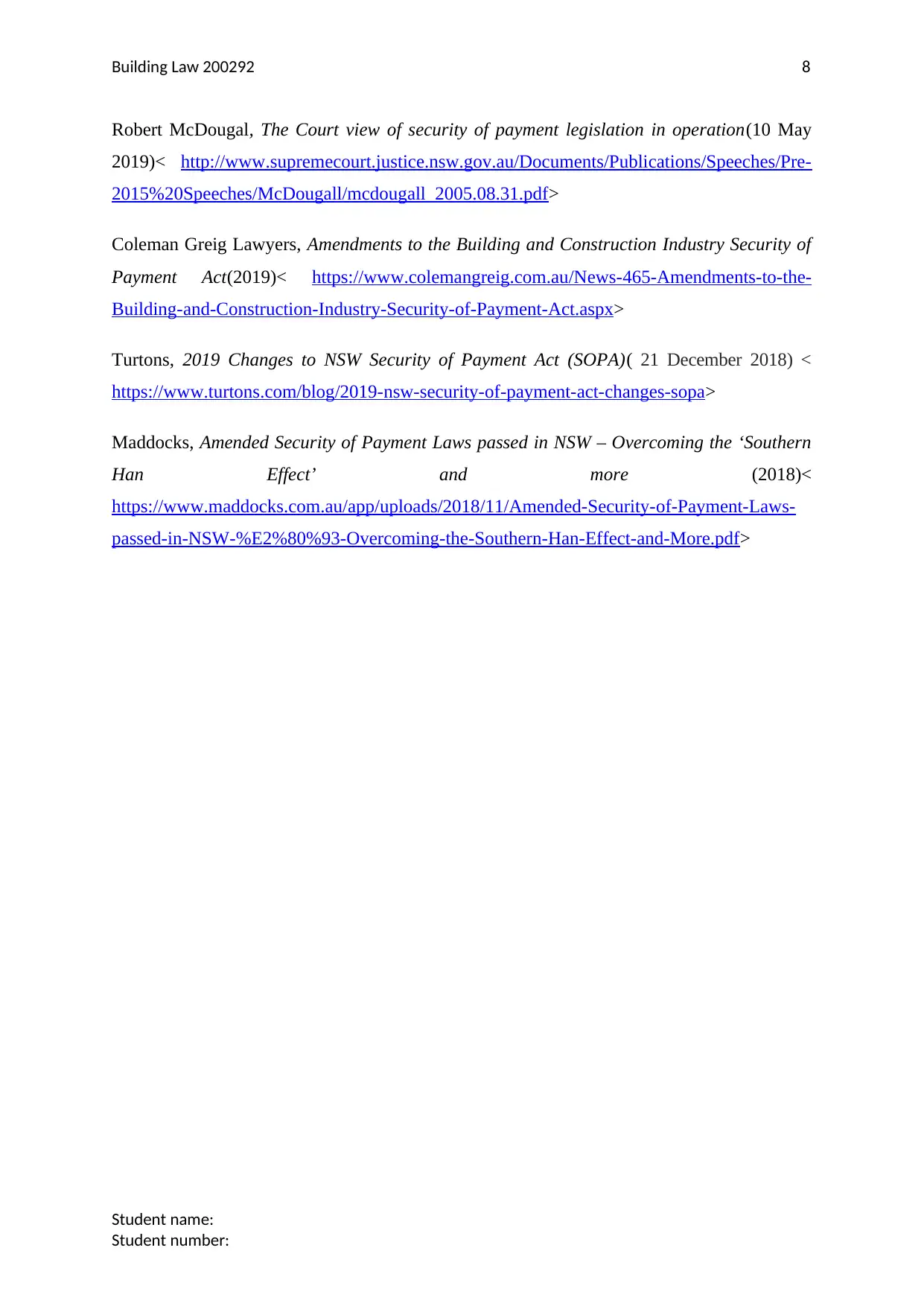
Building Law 200292 8
Robert McDougal, The Court view of security of payment legislation in operation(10 May
2019)< http://www.supremecourt.justice.nsw.gov.au/Documents/Publications/Speeches/Pre-
2015%20Speeches/McDougall/mcdougall_2005.08.31.pdf>
Coleman Greig Lawyers, Amendments to the Building and Construction Industry Security of
Payment Act(2019)< https://www.colemangreig.com.au/News-465-Amendments-to-the-
Building-and-Construction-Industry-Security-of-Payment-Act.aspx>
Turtons, 2019 Changes to NSW Security of Payment Act (SOPA)( 21 December 2018) <
https://www.turtons.com/blog/2019-nsw-security-of-payment-act-changes-sopa>
Maddocks, Amended Security of Payment Laws passed in NSW – Overcoming the ‘Southern
Han Effect’ and more (2018)<
https://www.maddocks.com.au/app/uploads/2018/11/Amended-Security-of-Payment-Laws-
passed-in-NSW-%E2%80%93-Overcoming-the-Southern-Han-Effect-and-More.pdf>
Student name:
Student number:
Robert McDougal, The Court view of security of payment legislation in operation(10 May
2019)< http://www.supremecourt.justice.nsw.gov.au/Documents/Publications/Speeches/Pre-
2015%20Speeches/McDougall/mcdougall_2005.08.31.pdf>
Coleman Greig Lawyers, Amendments to the Building and Construction Industry Security of
Payment Act(2019)< https://www.colemangreig.com.au/News-465-Amendments-to-the-
Building-and-Construction-Industry-Security-of-Payment-Act.aspx>
Turtons, 2019 Changes to NSW Security of Payment Act (SOPA)( 21 December 2018) <
https://www.turtons.com/blog/2019-nsw-security-of-payment-act-changes-sopa>
Maddocks, Amended Security of Payment Laws passed in NSW – Overcoming the ‘Southern
Han Effect’ and more (2018)<
https://www.maddocks.com.au/app/uploads/2018/11/Amended-Security-of-Payment-Laws-
passed-in-NSW-%E2%80%93-Overcoming-the-Southern-Han-Effect-and-More.pdf>
Student name:
Student number:
⊘ This is a preview!⊘
Do you want full access?
Subscribe today to unlock all pages.

Trusted by 1+ million students worldwide
1 out of 9
Related Documents
Your All-in-One AI-Powered Toolkit for Academic Success.
+13062052269
info@desklib.com
Available 24*7 on WhatsApp / Email
![[object Object]](/_next/static/media/star-bottom.7253800d.svg)
Unlock your academic potential
Copyright © 2020–2026 A2Z Services. All Rights Reserved. Developed and managed by ZUCOL.





